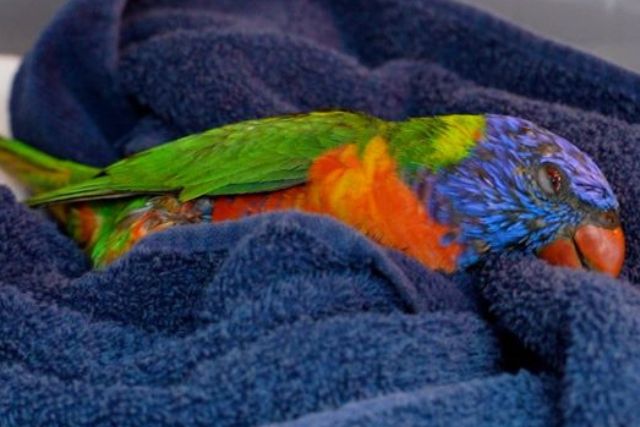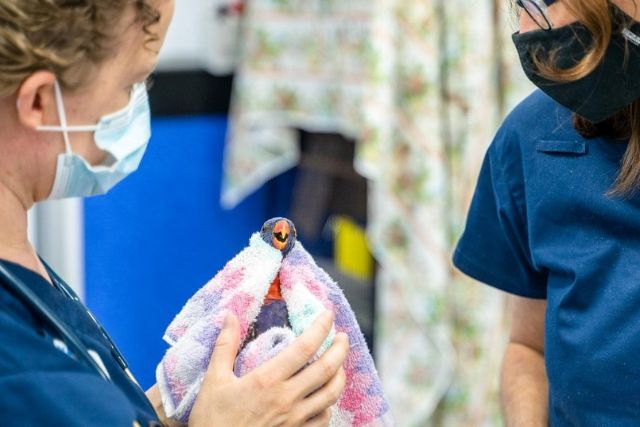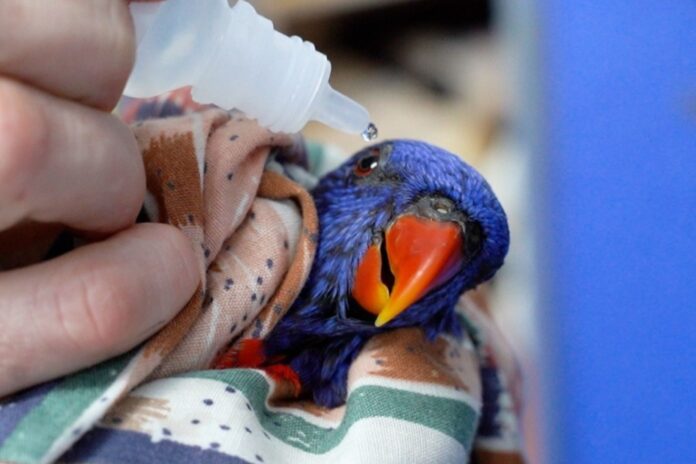Lorikeets usually seen barrel-rolling in the sun, tearing bottlebrushes apart and filling their neighbourhoods with familiar squawks are dropping from the sky like flies.
Unable to walk, eat, blink and eventually move at all, the Coast’s rainbows of the sky are suffering from lorikeet paralysis syndrome (LPS).
The syndrome is primarily seen in rainbow and scaly-breasted lorikeets. If left untreated, the birds are unable to feed themselves and die from dehydration and starvation.
RSPCA wildlife vet Tim Portas said the seasonal toxic event was ramping up in the region.

“LPS is a serious threat to our iconic lorikeets and needs immediate intervention,” Dr Portas said.
“At RSPCA, over half of the lorikeets admitted into care each year are affected by the dangerous and deadly toxin.
“It is treatable when found early but requires weeks of intensive care for the birds.”
Dr Portas said the RSPCA treated hundreds of lorikeets with LPS each summer, with the syndrome mainly found in Brisbane, the Sunshine Coast, Gold Coast and Gympie.
“Already in January, we’ve seen over 390 lorikeets admitted to our Brisbane and Eumundi centres with the syndrome,” Dr Portas said.
“Last year we cared for 3221 lorikeets, with a large portion of those requiring treatment for LPS.”
Dr Portas said that without intervention and intensive care, the affected lorikeets would have no chance of survival.
He said the cause of LPS is unknown at this stage, but research was ongoing.
“We are currently collecting intestinal contents and faeces from severely affected lorikeets and working with universities to perform plant DNA studies in the hope to find what lorikeets are eating that could be causing the disease,” he said.
“Thankfully, our iconic rainbow pilots can return to the wild, but this isn’t without around-the-clock care followed by weeks of rehabilitation before they can be released.”

Research conducted by Wildlife Health Australia, which has completed autopsies and laboratory testing, resulted in the conclusion that it was more likely not a virus but a toxin causing LPS.
“Wildlife disease experts have been investigating this syndrome and a wide range of tests have been done,” its report stated.
“The current investigation has found no evidence of an infectious disease as the cause of this syndrome. The possibility of an environmental or plant toxin is being investigated.”
While experts are still working out exactly what causes the illness, in the interim members of the public are being urged to do their bit to help.
“If you find a lorikeet that is unable to fly, has varying degrees of paralysis, seems wobbly or is unable to blink or swallow, seek them help immediately,” Dr Portas said.
If you notice a lorikeet with any of the above symptoms call the RSPCA’s 24/7 Animal Emergency Hotline on 1300 ANIMAL (1300 264 625), or your nearest wildlife carer. You can also take the bird directly to your local vet or wildlife hospital.
Do you have an opinion to share? Submit a Letter to the Editor with your name and town/suburb at Sunshine Coast News via: news@sunshinecoastnews.com.au





